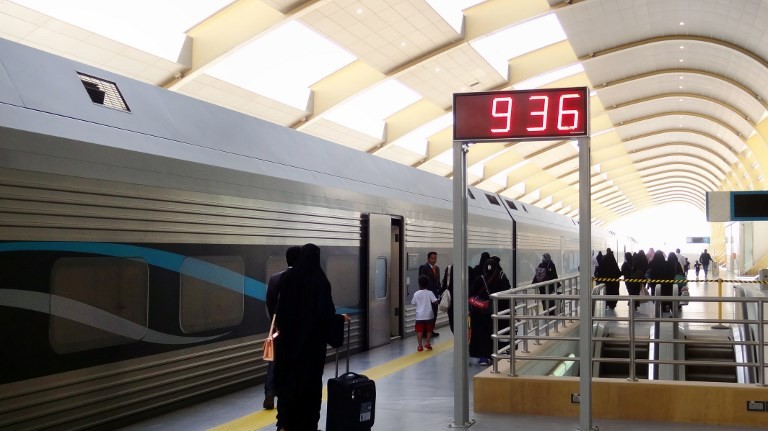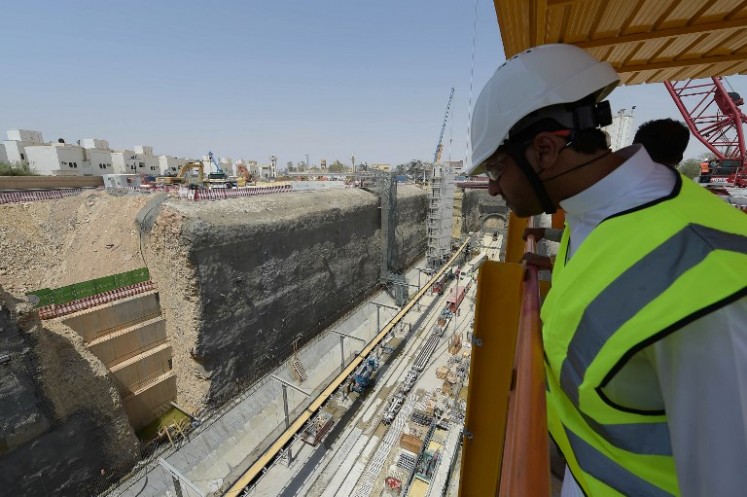Saudi to build 1,000-mile Red Sea-Gulf railway
Change Size
 Passengers board a new train service from the Saudi Railway Company at a station on the edge of the Saudi capital Riyadh on June 9, 2017. The service, which began early this year, links Riyadh with Majmaah and Qassim in the kingdom's heartland.
It is among railway expansion projects worth tens of billions of dollars in the kingdom as part of wideranging economic diversification efforts.
IA (Agence France -Presse/Ian Timberlake)
Passengers board a new train service from the Saudi Railway Company at a station on the edge of the Saudi capital Riyadh on June 9, 2017. The service, which began early this year, links Riyadh with Majmaah and Qassim in the kingdom's heartland.
It is among railway expansion projects worth tens of billions of dollars in the kingdom as part of wideranging economic diversification efforts.
IA (Agence France -Presse/Ian Timberlake)
S
audi Arabia plans to seek bidders for the construction of a 1,000-mile (1,600-kilometer) railroad linking the Red Sea with the Persian Gulf as early as the end of this year, signaling the go ahead for a long-delayed project seen as vital to reducing the economy’s dependence on oil.
The so-called Land Bridge line will shave around three days off the current five-day journey time for shipping seaborne freight around the Saudi coast, while improving links to Riyadh, and Jeddah, the nation’s two biggest cities.
Contract tenders will be issued at the end of 2017 or early in 2018 following an encouraging response to an invitation for expressions of interest, Saudi Railway Chief Executive Officer Bashar Al Malik said in an interview.
Saudi Arabia first awarded contracts for a privately funded coast-to-coast line in 2008 in an effort to accelerate the transit of goods around a country a fifth the size of the US, but put the project on hold after financial terms couldn’t be agreed. It’s now “moving ahead to implement the project” after an encouraging response from the private sector, Al Malik said.
The cost of the Land Bridge line will depend on the exact route chosen and the location of the Red Sea terminus, with bidding for contracts likely to include local and international engineering companies and financial institutions, according to Al Malik, who has been CEO of Saudi Railway since March.
Saudi Arabia allocated 52 billion riyals ($14 billion) to infrastructure and transportation this year, up from 38 billion riyals in 2016, according to the Ministry of Finance’s 2017 budget report. The investment is aimed at advancing moves to wean the Arab world’s biggest economy off oil as part of the Vision 2030 plan led by the heir to the Saudi throne, Mohammed bin Salman.

Saudi Railway is separately targeting increased freight shipments on the country’s Northern Line, including minerals transported for Saudi Arabian Mining, also known as Maaden. Phosphate volumes should rise to 5 million tons this year from 4.4 million in 2016, while bauxite carriage may improve to 4 million tons from 3.3 million, Al Malik said.
The railway company is evaluating its ability to boost capacity as Maaden and its partners Mosaic and Saudi Basic Industries expand production at Waad al-Shamal in the far north of the country, he said.
Saudi Railway is also looking at expanding rail links to better serve energy giant Saudi Arabian Oil Co., or Aramco. which has bulk plants in Tabuk, Turaif and the Al Jouf region close to the Jordanian border for the distribution of gasoline, diesel fuel and other liquid products.
Other opportunities for increased freight haulage center on agricultural production in the Busaita area of Al Jouf which hasn’t yet utilized rail infrastructure, Al Malik said. The zone has some of Saudi Arabia’s largest farms, including Al Jouf Agricultural Development’s 60,000 hectares of wheat, barley, maize and other crops.









